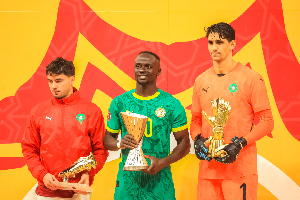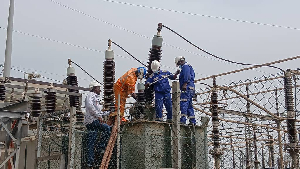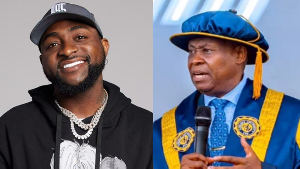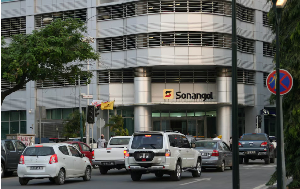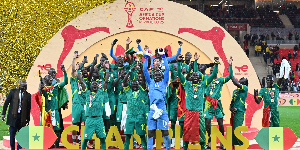By Kofi Thompson
One finds it hard to understand those very intelligent Africans, who give one the distinct impression that because in their view no African leader ought to appear before the International Criminal Court (ICC) - which they regard as a tool of imperialism and neo-colonialism before which Western leaders never appear - somehow one ought to overlook the plight of the millions of fellow Africans, who are victims of the continent's cruel and murderous regimes.
Yet, one doubts very much that the victims of the cruel African leaders who cause unspeakable suffering in places like the eastern provinces of the Democratic Republic of Congo and Darfur in the west of Sudan, would hold demonstrations to protest against Africans writing opinion pieces, which call for those ultimately responsible for maiming and murdering them in eastern Democratic Republic of Congo and Darfur, to be sent to the ICC for their roles in what are indeed despicable crimes against humanity.
One also doubts that potential victims of any breakdown in law and order in Ghana, resulting from reaction by party foot-soldiers (from across the spectrum) to the outcome of the December 2012 presidential election petition brought before the Supreme Court by the presidential candidate of the New Patriotic Party (NPP), Nana Addo Danquah Akufo-Addo - challenging the declaration by the Electoral Commissioner of President Mahama as the winner - would condemn those in Ghana who insist that they will ensure that those politicians (from across the spectrum) bearing ultimate responsibility for such a breakdown in law and order in Ghana, are also brought before the ICC.
Surely, the millions of families whose lives could be turned upside down, were Ghana to descend into violence and chaos as a result of a breakdown in law and order, must have the assurance that there will be no impunity for those politicians whose actions and inaction lead to the creation of a hell on earth for them in their own country?
Should all such politicians in Ghana not eventually end up in the very same place that Liberia's heartless leader Charles Taylor was prosecuted and jailed for his crimes against humanity perpetrated in Sierra Leone, I ask?
Where in Africa, and who in the continent, will try cruel and ruthless African leaders like Sudan's Omar Bashir?
To ensure justice for ordinary Africans, including Ghanaians, we must encourage the ICC to act when the very politicians in Africa who are supposed to promote peace and stability and ensure our security, turn around to organise the maiming and murdering of their own people.
The time has come to end impunity for politicians masterminding widespread violence in Ghana and elsewhere in Africa - by having them indicted and prosecuted by the ICC.
Those who say they are in politics to serve ordinary people must never do anything that will end up destroying our homeland Ghana.
The period immediately after the Supreme Court of Ghana's presidential election petition verdict is announced, will be the perfect time to gather evidence for possible ICC prosecutions.
For the benefit of those who might find it useful, below are frequently asked questions about the ICC, authored by the Council for Foreign Relations'(CFR) Claire Calzonetti, and culled from the CFR's website. Please read on:
'Frequently Asked Questions about the International Criminal Court'
Author: Claire Calzonetti Updated July 23, 2012
?How did the court begin?
?Who does the court aim to prosecute?
?What is the relationship between the United States and the ICC?
?What other countries are not involved?
?What cases are on the docket now?
?What is the relationship between the International Court and the national courts?
?What is the difference between the ICC and other international courts such as the international criminal tribunals and the UN’s International Court of Justice?
Who funds the court?
How did the court begin?
The concept of an international court was first discussed in the aftermath of World War II. However, it wasn't until the 1990s that the first ad hoc international criminal tribunals were set up to deal with war crimes in Rwanda and the former Yugoslavia. The ad hoc tribunals were limited in their efficiency and deterrent capability, which spurred the need for a permanent court to deal with the world's most serious crimes. A statute to establish the International Criminal Court (ICC) for creating such a body was approved at a United Nations (UN) conference in Rome on July 17, 1998. After receiving more than sixty ratifications by April 2002, the treaty became legal on July 1, 2002. On March 11, 2003, the ICC opened with Canadian Philippe Kirsch as judge-president, and Elizabeth Odio Benito of Costa Rica and Akua Kuenyenia of Ghana as vice presidents.
Who does the court aim to prosecute?
The ICC seeks to try individuals who perpetrate the world's most serious crimes, such as genocide (the intentional and systematic annihilation of an ethnic, racial, or religious group) war crimes, crimes against humanity, and crimes of aggression. War crimes are violations of the international Geneva Convention to protect prisoners of war, as well as other laws that apply to international armed conflict. Crimes against humanity include those crimes that systematically exterminate, enslave, torture, rape, and persecute victims based on political, gender, religious, ethnic, national, or cultural differences. Crimes of aggression consist of the use of armed force by a state against the territorial integrity, sovereignty, or political independence of another state, or violations of the Charter of the United Nations.
What is the relationship between the United States and the ICC?
At the time of statute negotiations, the United States opposed the court, fearing U.S. soldiers could be subject to trivial or politically motivated prosecutions. After the establishment of the court, the United States insisted on immunity for all its military personnel operating in UN peacekeeping missions, particularly in East Timor and Bosnia-Herzegovina. This immunity was denied in East Timor. However, after increased pressure from the U.S. veto of a UN-extended peacekeeping mission in Bosnia-Herzegovina--and a threat to block future UN missions, starting with Bosnia, if the Security Council did not accept the terms of immunity--Washington was granted a one-year exemption from prosecution to be renewed every year, as a compromise.
The United States also formed bilateral agreements with other nations obliging them not to hand over U.S. personnel to the ICC; in 2002, Congress passed the American Service Member's Protection Act, authorizing the president to use all means necessary to free U.S. personnel detained by the ICC. Though former President Bill Clinton signed the treaty at the end of his second term, President George W. Bush withdrew the U.S. signature in 2002.
What other countries are not involved?
Seven countries voted against the statute: China, Iraq, Israel, Libya, Qatar, the United States, and Yemen. China objected on grounds that "the statute is an attempt to interfere with the domestic affairs of a sovereign nation." Other non-members include India, Iran, Japan, North Korea, Pakistan, Saudi Arabia, Sudan, Syria, and Turkey. While most Western European and South American countries are signatories, there are only two Arab nation members—Jordan and Tunisia. There are eighteen Asian members of the ICC.
What cases are on the docket now?
The Office of the Prosecutor (OTP) has been referred cases from Uganda, the Central African Republic, and the Democratic Republic of the Congo. In addition, the UN Security Council gave its first referral for the Darfur region of Sudan to the OTP in March 2005, followed in 2011 by a unanimous referral for Libya. The OTP is conducting investigations in Uganda, the Democratic Republic of the Congo, Sudan, and Libya. The investigation in the Democratic Republic of Congo resulted in the July 22, 2012 sentencing of Thomas Lubanga Dyilo to fourteen years in prison for war crimes, the first ICC sentencing. The OTP also opened investigations proprio motu in Cote d'Ivoire in 2011, after the country reconfirmed its acceptance of the ICC's jurisdiction, and in Kenya, after the prosecutor's request to open investigations into the post-election violence was granted in 2010.
What is the relationship between the International Court and the national courts?
The ICC is based on a principle of complementarity. This means that the ICC can only act when a national court is unable or unwilling to carry out a prosecution itself because the ICC was not created to supplant the authority of the national courts. However, when a state's legal system collapses or when a government is a perpetrator of heinous crimes, the ICC can exercise jurisdiction.
What is the difference between the ICC and other international courts such as the international criminal tribunals and the UN’s International Court of Justice?
The international criminal tribunals in Rwanda and former Yugoslavia can only try individuals who committed crimes against humanity in those territories over a specific period of time. The International Criminal Court, on the other hand, can rule on all crimes committed against humanity regardless of its location so long as they have occurred after July 1, 2002. The role of the International Court of Justice is to rule on arguments that occur between governments. Unlike the International Criminal Court, it does not have the ability to try individuals.
Who funds the court?
The ICC, as an independent body, is funded primarily by its member states. The contributions of each state are determined by the same method used by the UN, which roughly corresponds with a country's income. Additional funding is provided by voluntary government contributions, international organizations, individuals, corporations, and other entities. The United Nations may provide funding if it is approved by the General Assembly and is related to a "situation" referred to the court by the Security Council.
Opinions of Wednesday, 3 April 2013
Columnist: Thompson, Kofi




